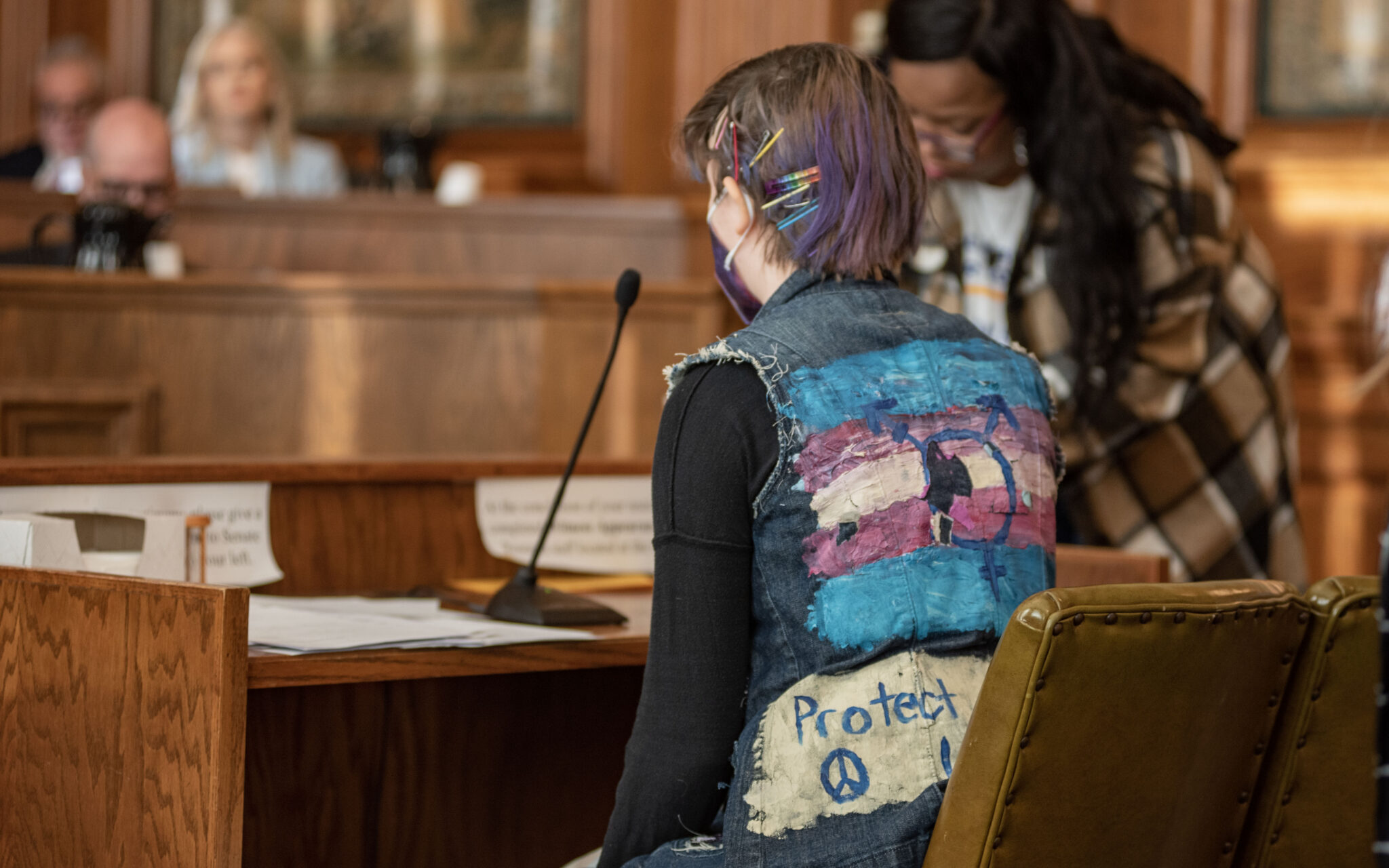Rating: Transphobic, Missouri Independent, August 25, 2023 (PDF archive) (HTML archive) (Take Action)
Action Recommendations
- Suggest/Improve an Action on the GenderMenace.net Action Portal!
Content Summary
Poll finds Missouri voters back bans on transgender health care • Missouri Independent
UPDATE on Friday, Aug. 25, at 3:15 p.m.: This story was updated to reflect the decision by Circuit Judge Steven Ohmer, who handed down a ruling Friday afternoon against an injunction on Missouri’s statute outlawing gender-affirming medical care for minors.
As Missouri awaited a court decision on whether minors will be barred from receiving puberty blockers or gender transition surgery, a poll released this week shows strong public support for the law.
After Circuit Judge Steven Ohmer ruled Friday afternoon against an injunction on the state’s new law against transgender medical care for minors, the bill signed in May by Gov. Mike Parson will take effect Monday. Ohmer this week concluded a two-day hearing in a lawsuit filed by the ACLU of Missouri, Lambda Legal, and Bryan Cave Leighton Paisner LLP on behalf of three plaintiffs.
Without further legal challenge, the bill will, for four years, ban surgical interventions and hormone therapies. Minors already receiving hormone therapies will be allowed to continue. Counseling that does not involve medical intervention is not included in the ban.
Without further action, the ban will expire on Aug. 28, 2027.
The St. Louis University/YouGov poll released Tuesday found strong opposition to medical interventions for people under 18, with 63% approving bans on hormone therapies like puberty blockers and 24% opposed. Seventy-three percent favored outlawing gender-transition surgeries for minors, and 14% opposed.
Survey details
The St. Louis University/YouGov poll, conducted about every six months, tracks voter perceptions of major politicians and institutions, and dives into attitudes on major issues making headlines. The latest poll, conducted from July 27 to Aug. 8, examined issues surrounding sexual orientation, gender and education.
The poll surveyed 900 Missourians and had an error margin of 4%.
In an interview, poll director Steven Rogers said the findings reveal that Missourians are nuanced in their attitudes. The survey found equal numbers of respondents – 44% – on both sides of the question of whether minors should be able to receive gender-affirming counseling.
“Missourians indisputably favor restricting gender transition medical care for minors,” Rogers said. “But they do not completely oppose gender-affirming care for minors.”
Robert Fischer, spokesman for PROMO, one of Missouri’s oldest LGBTQ advocacy groups, said he wasn’t surprised by the results.
“Even though these numbers look frightening, or look very discouraging to someone looking at them, what it tells us at PROMO is there is a lot more education for what it means to be transgender and what that looks like in Missouri,” Fischer said.
Most people don’t know anyone who has dealt with gender identity issues, leading many to hold stereotyped views, he said.
“On marriage equality, the education that took place was that these are your neighbors, these are your parents, these are your teachers, who just want the ability to marry the person they love,” Fischer said.
LGBTQ issues and book bans
The SLU/YouGov poll, along with seeking opinions on gender-affirming treatments, asked respondents to give their opinion on same-sex marriage, when discussions of LGBTQ issues are acceptable in schools and whether books with stories about LGBTQ youth should be available in school libraries.
The poll also surveyed attitudes on sports participation. A ban on transgender students competing in sports in alignment with their gender will also take effect Monday. Two-thirds of those surveyed expressed similar values. Unlike the ban on treatments, the sports law has not been challenged in court.
The top-line results show a majority of Missourians, 56%, now support legal recognition of same-sex marriage. Only Republicans, as a defined group in the poll, continue to oppose it, with 63% of them saying it should not be allowed.
In August 2004, a constitutional amendment defining marriage as only between a man and a woman passed with 71% of the vote.
When the question is whether Missouri should enact a statute like Florida’s “Don’t say gay” law that bans discussions of LGBTQ issues in schools, the survey found that 56% of respondents approve of those discussions at the high school level, while 69% said they are not appropriate in elementary schools.
Respondents opposed book bans, with 54% opposing schools removing books with stories about lesbian and gay youth, and 49% opposing removal of books with stories about transgender youth.
Younger, more affluent voters surveyed, and those in metro areas, leaned more toward allowing treatments, discussions and sports participation for transgender youth.
In the statehouse
Sen. Mike Moon, R-Ash Grove and sponsor of the transgender health care law being challenged in court, said the results aren’t entirely surprising.
“I am pleased, really, that there are those who seem to lean toward protecting children,” Moon said.
During this year’s legislative session, transgender young people and their parents packed legislative hearings and filled overflow rooms to show their opposition to bans on medical care. The four-year moratorium on new medical interventions instead of a permanent ban was the deal that ended a filibuster by Senate Democrats.
By the end of the 2023 legislative session, the American Civil Liberties Union was tracking 48 bills in Missouri the organization deemed anti-LGBTQ. Only one state, Texas, had more bills on the ACLU’s list. By the end of the session, many families with transgender children were thinking of leaving the state.
‘There’s no point in staying’: Transgender Missourians describe toll of legislative session
“I think a good portion of the rhetoric that has come out of the Missouri state government has been focused on pushing this as wedge issues,” Fischer said.
Pressure on Republicans to overcome the filibusters came from conservative religious groups that play a big role in GOP primary elections. That political pressure was instrumental in making gender identity an issue in the legislature, Fischer said.
Moon, who lost a GOP primary for Congress last year, said he’s not filing his bills to seek votes. Along with the ban on treatments, Moon unsuccessfully tried to ban all discussions of sexual orientation and gender identity in public school settings.
“I don’t do things based on which way the wind is blowing, and I don’t vote thinking how this is going to affect my next election,” Moon said. “This issue was not brought to me as something to do to gain support.”


Leave a Reply